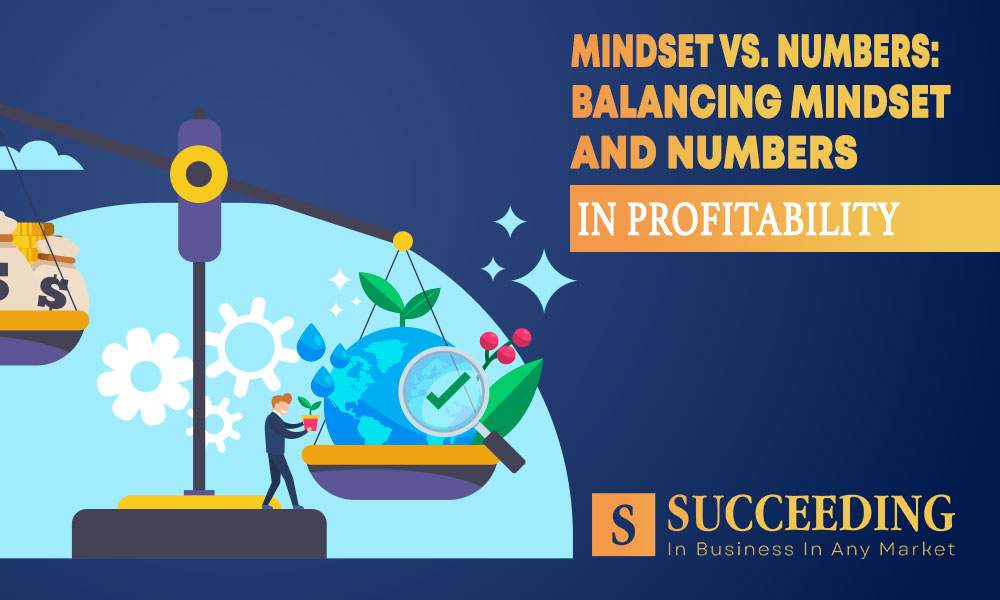Post Date: March 24, 2024

In the dynamic landscape of entrepreneurship, the delicate interplay between mindset and numbers stands as a critical determinant of success. This article explores the synergy required to strike a balance between a positive entrepreneurial mindset and the analytical prowess of numbers, all in pursuit of achieving bankable profits. Join us as we delve into the depths of “Balancing Mindset and Numbers in Profitability.”
The Role of Mindset in Entrepreneurship
The entrepreneurial journey is inherently tied to the mindset an individual brings to the table. A positive entrepreneurial mindset is marked by resilience, creativity, and the ability to navigate challenges with a forward-thinking approach. Entrepreneurs with a growth-oriented mindset view obstacles not as insurmountable barriers but as opportunities for innovation and growth.
The Importance of Numbers in Profitability
While a positive mindset fuels innovation, numbers provide the foundation for informed decision-making. Financial literacy and a solid understanding of key metrics are indispensable for strategic planning, budgeting, and risk management. The importance of crunching the numbers cannot be overstated, as they offer insights into the financial health of a business and guide prudent resource allocation.
Striking the Balance: Why Both Matter
The crux lies in recognizing that both mindset and numbers play pivotal roles in the journey toward profitability. An entrepreneur with a positive mindset but lacking financial acumen may struggle to translate innovative ideas into sustainable profits. Conversely, a numbers-focused approach without a positive and adaptive mindset can stifle creativity and hinder adaptability in the face of challenges.
The Pitfalls of Imbalance
An imbalance between mindset and numbers can lead to pitfalls in the entrepreneurial journey. Overly optimistic mindsets, while fueling innovation, may overlook financial realities and lead to overextension. On the other hand, a hyper-focus on numbers without considering the human and creative aspects can result in a sterile business approach, stifling adaptability and hindering long-term profitability.
Strategies for Balancing Mindset and Numbers
Balancing mindset and numbers requires a strategic approach. Entrepreneurs can align their positive mindset with realistic financial goals by setting clear and achievable objectives. Integrating financial education into their entrepreneurial journey enhances the ability to make data-informed decisions while maintaining a creative and adaptive mindset. The synergy of both elements amplifies the potential for sustainable profitability.
Case Studies of Successful Balance
Real-world examples illuminate the successful navigation of the delicate balance between mindset and numbers. Businesses that have thrived leveraged both a positive mindset for innovation and a keen understanding of financial metrics for sound decision-making. These case studies serve as beacons, demonstrating how a harmonious integration of mindset and numbers propels businesses toward bankable profits.

Conclusion:
In conclusion, the intersection of mindset and numbers forms the nexus of entrepreneurial success. The entrepreneur who can seamlessly balance a positive mindset with financial acumen is poised not only to weather challenges but to innovate and achieve sustained profitability in a competitive landscape.
As you reflect on the symbiotic relationship between mindset and numbers, we encourage you to share your insights and experiences. How do you strike a balance in your entrepreneurial journey? Engage with our community, share your strategies, and contribute to the collective wisdom that propels entrepreneurs toward bankable profits.
FAQs:
Q1: Can a positive mindset alone lead to profitability in entrepreneurship?
A1: While a positive mindset is crucial for innovation and resilience, it alone may not guarantee profitability. The integration of a positive mindset with a sound understanding of numbers and financial analysis is essential for making informed and profitable business decisions.
Q2: How can entrepreneurs improve their financial literacy for better profitability?
A2: Entrepreneurs can improve financial literacy by seeking education, attending workshops, and engaging with financial professionals. Understanding key financial metrics, budgeting, and financial planning are essential skills for making informed decisions that contribute to profitability.
Q3: Is there a danger in being too focused on numbers and neglecting mindset?
A3: Yes, an exclusive focus on numbers without considering mindset can lead to a lack of innovation, adaptability, and resilience. Striking a balance between mindset-driven creativity and data-informed decision-making is crucial for sustained profitability.
Q4: What role does innovation play in the success of MAPs?
A4: Innovation is a crucial component of MAP success. Fostering a culture of innovation within the organization ensures that the MAP remains dynamic and responsive to changing market conditions. Integrating innovative strategies can unlock new opportunities and set the business apart in a competitive landscape.
Q5: How can MAPs contribute to sustainable growth in a business?
A5: MAPs contribute to sustainable growth by providing a structured and intentional approach to business development. By setting and achieving ambitious goals, businesses can continuously evolve, adapt to market changes, and position themselves for long-term success.
Q6: Can businesses recover from financial setbacks with a positive mindset?
A6: A positive mindset can be instrumental in overcoming financial setbacks by fostering resilience and encouraging creative problem-solving. However, recovery also requires a strategic and data-informed approach to address the root causes of the setbacks and implement effective solutions for sustained profitability.




